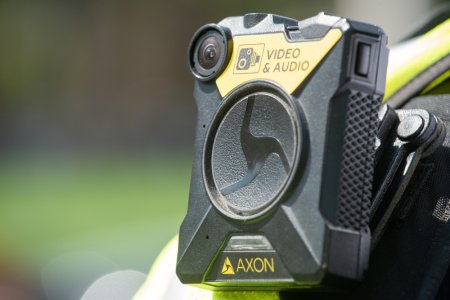Major supermarkets provide body-worn cameras to staff over surge in violent customer incidents
By
Seia Ibanez
- Replies 22
The Australian retail landscape is changing, not just in the way we shop but also in the way stores are ensuring the safety of their staff.
In a move that reflects the growing concern over workplace safety, some of Australia's retail giants—Bunnings, Coles, and Woolworths—have taken a firm stance against the alarming rise in violent customer incidents.
These retailers have responded by equipping their staff with body-worn cameras to protect employees from the surge of aggressive behaviour they face.
This initiative comes after a series of troubling events that have highlighted the need for increased security measures within the retail sector.

Bunnings has been at the forefront of this initiative. After facing criticism for breaching privacy laws by using facial recognition technology, Bunnings has shifted its focus to 'team safety cameras' to deter and document instances of customer aggression.
The company began trialling these cameras in 2022, and the move has since been justified by the release of compilation footage showing staff members being threatened with weapons and physically attacked.
This footage spanned incidents across Australia and New Zealand.
Similarly, Coles has confirmed that it has equipped employees in certain stores with body cameras as of September, in response to a spike in theft and customer abuse.
‘It's important to note that the majority of customers do the right thing in store. Measures like this are for the ones who don't,’ a Coles spokesperson said.
‘The safety of our team members and customers is our top priority, and we have a range of security measures in place to reduce theft from our stores including security personnel and surveillance technologies such as CCTV.’
Coles clarified that it does not use facial recognition technology.
According to the spokesperson, staff members have the option to activate body cameras if they feel unsafe.
‘They can easily request emergency assistance in the event of an emergency or threatening situation,’ the spokesperson said.
‘Every effort will be made to inform the customer that they are turning it on for safety.’
‘The body-worn cameras have been well received by team members, who feel that the technology benefits them if faced with a threatening situation.’
Woolworths, another supermarket heavyweight, initiated a staff body camera trial in 2021 to address incidents of physical and sexual assault.
‘Team safety cameras have been introduced across a number of our stores around the country,’ the Woolworths spokesperson said.
‘We're always looking at different methods to ensure the safety of our team and customers.’
Woolworths also doesn’t use facial recognition technology in its stores.
With around 700,000 retail crime events reported in the 12 months ending in April 2024, the urgency for action is clear.
Queensland has taken legislative steps to enforce stronger penalties for violent customers, including those in the retail sector.
However, the Australian Retailers Association (ARA) is advocating for more to be done at a national level, with Chief Executive Paul Zahra calling for harsher penalties for violence in retail-specific work settings.
‘We want to see harsher penalties for people committing violence in retail-specific work settings,’ Zahra said.
‘No one should go to work fearing for their safety, but unfortunately, this is the reality for many retail workers.’
 Have you or someone you know encountered aggressive behaviour while shopping or working in retail? What are your views on staff using body-worn cameras? Let us know in the comments below!
Have you or someone you know encountered aggressive behaviour while shopping or working in retail? What are your views on staff using body-worn cameras? Let us know in the comments below!
In a move that reflects the growing concern over workplace safety, some of Australia's retail giants—Bunnings, Coles, and Woolworths—have taken a firm stance against the alarming rise in violent customer incidents.
These retailers have responded by equipping their staff with body-worn cameras to protect employees from the surge of aggressive behaviour they face.
This initiative comes after a series of troubling events that have highlighted the need for increased security measures within the retail sector.

Major supermarkets provide their staff with body-worn cameras amid the rise of violent customer incidents. Credit: John Gomez / Shutterstock
Bunnings has been at the forefront of this initiative. After facing criticism for breaching privacy laws by using facial recognition technology, Bunnings has shifted its focus to 'team safety cameras' to deter and document instances of customer aggression.
The company began trialling these cameras in 2022, and the move has since been justified by the release of compilation footage showing staff members being threatened with weapons and physically attacked.
This footage spanned incidents across Australia and New Zealand.
Similarly, Coles has confirmed that it has equipped employees in certain stores with body cameras as of September, in response to a spike in theft and customer abuse.
‘It's important to note that the majority of customers do the right thing in store. Measures like this are for the ones who don't,’ a Coles spokesperson said.
‘The safety of our team members and customers is our top priority, and we have a range of security measures in place to reduce theft from our stores including security personnel and surveillance technologies such as CCTV.’
Coles clarified that it does not use facial recognition technology.
According to the spokesperson, staff members have the option to activate body cameras if they feel unsafe.
‘They can easily request emergency assistance in the event of an emergency or threatening situation,’ the spokesperson said.
‘Every effort will be made to inform the customer that they are turning it on for safety.’
‘The body-worn cameras have been well received by team members, who feel that the technology benefits them if faced with a threatening situation.’
Woolworths, another supermarket heavyweight, initiated a staff body camera trial in 2021 to address incidents of physical and sexual assault.
‘Team safety cameras have been introduced across a number of our stores around the country,’ the Woolworths spokesperson said.
‘We're always looking at different methods to ensure the safety of our team and customers.’
Woolworths also doesn’t use facial recognition technology in its stores.
With around 700,000 retail crime events reported in the 12 months ending in April 2024, the urgency for action is clear.
Queensland has taken legislative steps to enforce stronger penalties for violent customers, including those in the retail sector.
However, the Australian Retailers Association (ARA) is advocating for more to be done at a national level, with Chief Executive Paul Zahra calling for harsher penalties for violence in retail-specific work settings.
‘We want to see harsher penalties for people committing violence in retail-specific work settings,’ Zahra said.
‘No one should go to work fearing for their safety, but unfortunately, this is the reality for many retail workers.’
Key Takeaways
- Bunnings, Coles, and Woolworths have introduced staff-worn body cameras in reaction to an increase in violent incidents involving customers.
- Bunnings has released CCTV footage displaying confrontations between staff and customers after being criticised for using facial recognition technology.
- Coles began deploying body-worn cameras in September to tackle theft and customer abuse, affirming that staff safety is a priority.
- Woolworths confirmed the use of body cameras in some stores, and there is a national discussion about implementing tougher penalties for violence against retail workers.







